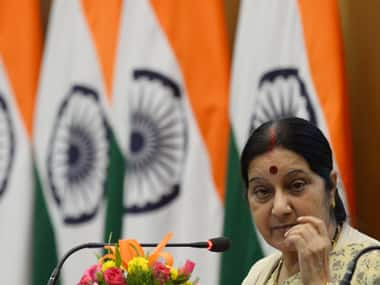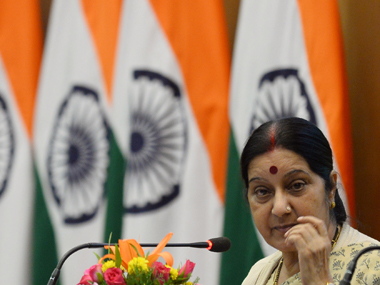In October 2013, at a press conference in Jaipur, the then spokesperson of the BJP and the present Minister of State for Commerce and Industry Nirmala Sitharaman called Lalit Modi a fugitive. Angered by his tweets on the BJP, she asked, “Who’s he…? A fugitive from law, he cannot question the BJP, we abide by the law of the land.” A year later, while her party is in power, her foreign affairs minister Sushma Swaraj went out of her way to get him travel documents from the British government because his passport had been revoked by the Indian government for his alleged violation of Foreign Exchange Management Act (FEMA). In connection with the case, the Enforcement Directorate also had issued a blue corner notice against him. When Sushma Swaraj assisted Lalit Modi with his travel documents, what in fact she did was to help a ‘fugitive’, as Sitharaman had dubbed him two years ago. He had run away from the process of Indian law and as a result was stripped off his Indian passport. Strangely, within a few months of the BJP government coming to power, the Delhi High Court restored his passport and the Government of India, which had earlier revoked the passport, chose not to appeal against the decision. [caption id=“attachment_2296238” align=“alignleft” width=“380” class=" “]  Union External Affairs Minister Sushma Swaraj. AFP[/caption] Swaraj claims that she has done nothing wrong other than taking a “humanitarian view” of an Indian. That he was a fugitive from Indian law, that he has been hiding from the ED’s investigations on a multi-million dollar scam and that the previous government had on record advised the British government against giving him any travel documents. Had she consulted with the finance ministry, her own officers, and done the due diligence before revoking an existing order against him by the Union government? Is India a banana republic were law is whimsical? Looks like, along with Swaraj, the Home Minister Rajnath Singh, BJP president Amit Shah, and the RSS think it is. They feel that there was nothing wrong with what Swaraj did. Some BJP leaders even averred that Lalit Modi was a “fugitive” (only) for the UPA government! Even a simple reading of the basic facts of the case shows that what Swaraj has done is great impropriety. In the study of public administration and public service ethics, the “appearance of impropriety” itself is big deal. In democracies such as the US, the standards are pretty high and appropriate codes have even “appearance of impropriety” as an element. The simple “Prudent Person Rule”, derived from the English Common Law has a basic test: would a reasonable person armed with all the facts conclude that an action or inaction was inappropriate? Swaraj and her party would say that the Lalit Modi act was appropriate, but the facts of the case show that it was highly inappropriate and did amount to “impropriety”. And this impropriety needs to be investigated because it folds in itself a conflict of interest. According to media reports that emerged so far, Swaraj’s daughter was a lawyer for Lalit Modi and the British MP Keith Vaz who was mediating for him reportedly helped secure an admission for a Swaraj relative at Sussex. More over, by Lalit Modi’s own admission, he is close to some BJP leaders. Swaraj’s action has punched a big hole in the BJP government’s claims of corruption or scam free governance. UPA’s mega scams have reduced the idea of corruption to swindling money and BJP was happy to use it as a cover for its impropriety. Corruption is not just about money and defies simple definition. In fact, because of this complexity, the UN convention against corruption in 2002 even chose not to define it and listed examples that make corrupt practices. Favouritism, nepotism and clientelism; abuse of discretionary powers; exploiting conflict of interests; and political contributions are among the practices that the UN has listed as corruption. Has the BJP government been free from of any of these elements? Look at some of its decisions so far. Sacking Amartya Sen from Nalanda University, replacement of the foreign secretary who still had six months to go with a man who was about to retire, change of the DRDO chief 15 months ahead of the expiry of his contract, and the appointment of Pahlaj Nihalani, who had called Prime Minister Modi as his hero, as the head of the censor board. And the most ridiculous was the appointment of an unknown actor as the head of the prestigious Film and Television Institute of India (FTII) whose credentials were his miniscreen portrayal of the Mahabharata character Yudhishthira and an old BJP card. The HRD minister Smriti Irani has filled leading institutions with RSS men. Vishram Ramchandra Jamdar as the head of Visvesvaraya National Institute of Technology, Nagpur: Professor Inder Mohan Kapahy as a member of the University Grants Commission (UGC); Baldev Sharma, former editor of RSS mouthpiece Panchajanya, as chairman of National Book Trust and Professor Y Sudershan Rao as the chairperson of the Indian Council for Historical Research (ICHR). If the BJP is really committed to ending corruption, it cannot pick and choose and defend blatant impropriety. Justifying the undue help to Lalit Modi by asking the Congress about Warren Anderson and Quattrocchi exposes its double standards. In his election campaign, did Narendra Modi say that Congress was its benchmark for corruption?
A year later, while her party is in power, her foreign affairs minister Sushma Swaraj went out of her way to get him travel documents from the British government because his passport had been revoked by the Indian government for his alleged violation of Foreign Exchange Management Act (FEMA). In connection with the case, the Enforcement Directorate also had issued a blue corner notice against him.
Advertisement
End of Article


)
)
)
)
)
)
)
)
)



